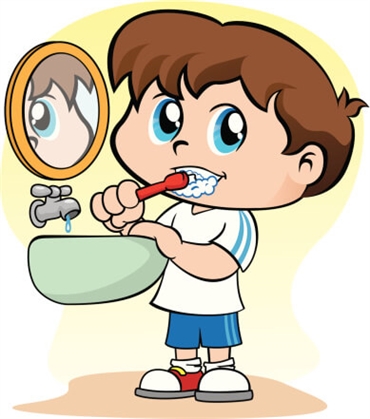Should I brush my teeth before or after breakfast?
April 29, 2017

You might not have realized, but the topic of brushing before or after breakfast is quite a contentious one for dental professionals and patients alike. Tradition says to brush after meals. This helps you get rid of the harmful bacteria and food particles that build up in your mouth and cause decay. But many people wake up with terrible morning breath, and want to have clean teeth and fresh mouth before they eat and start the day. Which practice is best? Here is what you need to know:
What happens in the mouth while you sleep?
At night your mouth works much like the rest of your body—it slows down. While you sleep saliva production decreases and your mouth dries out. Research shows that 80 to 90 percent of your saliva production happens during the day, with only 10 to 20 percent produced at night. Saliva naturally fights the growth of bacteria and helps protect your teeth and gums. Without saliva the bacteria breed and grow faster, putting your teeth and gums at greater risk. In the morning your teeth are exposed because of a lack of saliva, and more vulnerable than ever.
Reasons to brush after breakfast
Certain drinks and foods, especially those high in sugar and fermentable carbohydrates, feed the bad bacteria in your mouth. When the bacteria metabolize the sugars and carbs they produce acids which attack your tooth enamel. The attack can start within five minutes and last for a minimum of 20 minutes after your last bite. This is why many professionals advocate the importance of brushing your teeth after each meal or snack, to get rid of the sugars and starches as well as the bacteria. But this might not be the best preventative care.
The equation for dental decay is plaque bacteria plus carbohydrate. You do eliminate both by brushing after breakfast, but only after the acids have started going to work on your enamel. By eliminating the bacteria ridden biofilm first, you can completely eliminate acid production.
Should I floss before or after brushing my teeth?
Reasons to brush before breakfast
For some people the horrible taste in their mouth is too much to tolerate, and affects the taste of food. Or they wake up and go to the gym or yoga studio before doing anything else. These people prefer to brush their teeth before breakfast as a matter of convenience. But there is more to it. In the morning the mature bacteria in your mouth are poised for attack, and begin metabolizing sugars into acids almost immediately. You can stop this by brushing before you eat.
Additionally, most breakfasts include foods and beverages that are highly acidic, like oranges, grapefruit, pineapple, and coffee. These soften the already exposed enamel through the process of demineralization. If you brush immediately after breakfast, it can be detrimental and leave you vulnerable to toothbrush abrasion. So instead, many dental professionals suggest you brush before breakfast to kickstart saliva flow and help buffer your teeth against acids. Then you simply rinse your mouth thoroughly with water after eating to neutralize the acids in your mouth and avoid abrasion.
Ask yourself this question
It all comes down to the reasons why you brush. Are you brushing to remove plaque or are you brushing to remove food particles? The message most consumers receive is to brush after meals in an attempt to remove food. But dentists and hygienists are concerned about plaque removal. As such, it proves more beneficial to brush before eating, eliminating plaque before introducing carbs and sugars. That said, the most important thing is to just do it. Brush your teeth at least a couple of times a day, once in the morning and most especially before bed. And it is just as important to clean between teeth by using dental floss or an oral irrigator.
If you have questions, ask your dentist or hygienist about when would be the best time for you to brush. They will consider your habits, lifestyle choices, and unique circumstances before giving you an answer.

